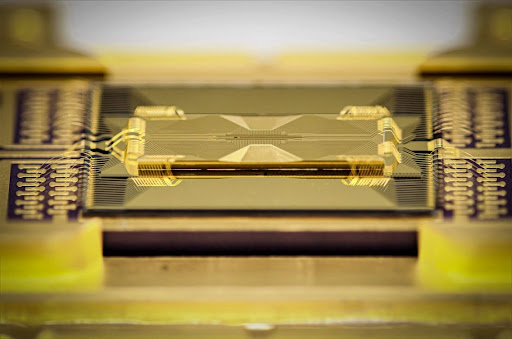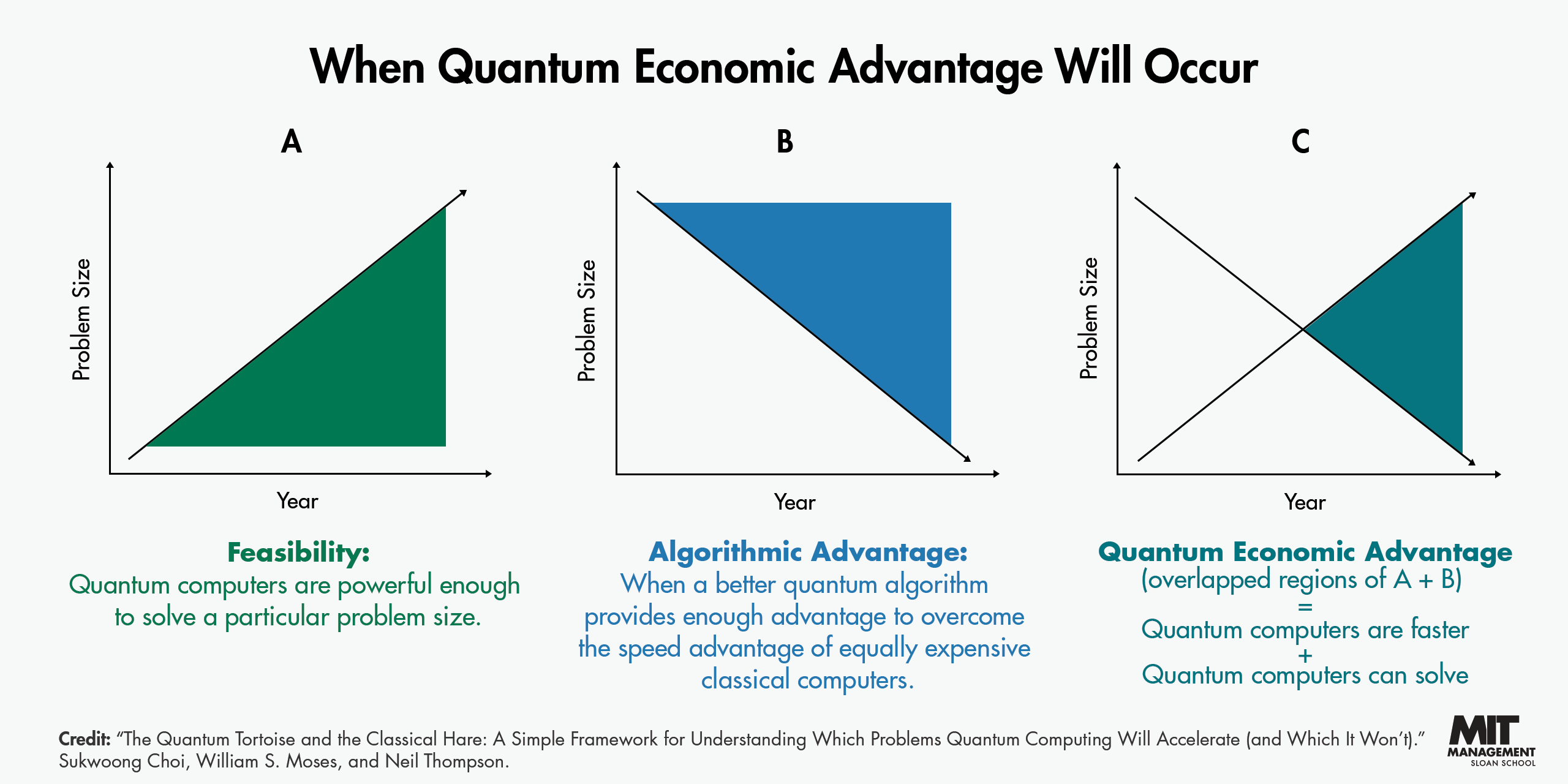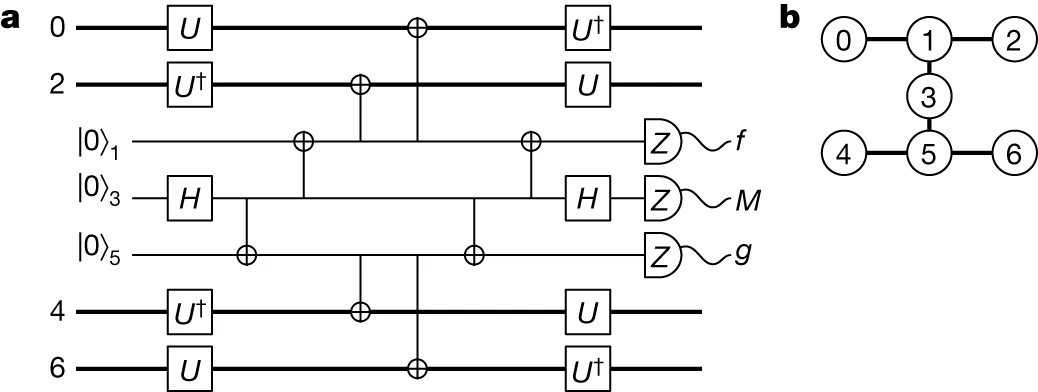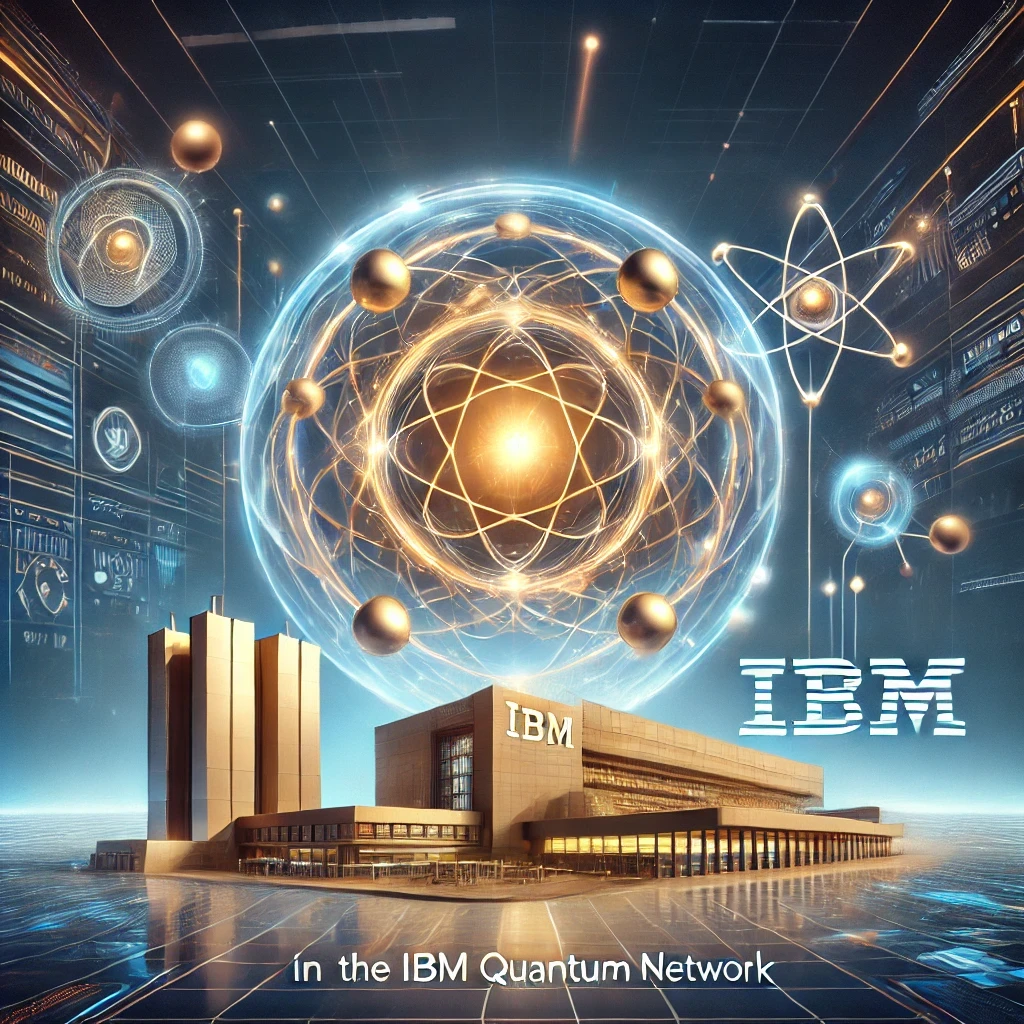Quantum ComputingView All Blogs

Adiabatic Quantum Computing: Concept, Applications, and Challenges
Explore the concept of Adiabatic Quantum Computing (AQC), its principles, applications, and challenges. Understand the adiabatic theorem, problem Hamiltonian, quantum annealing, and the potential of AQC in solving complex problems across various domains.
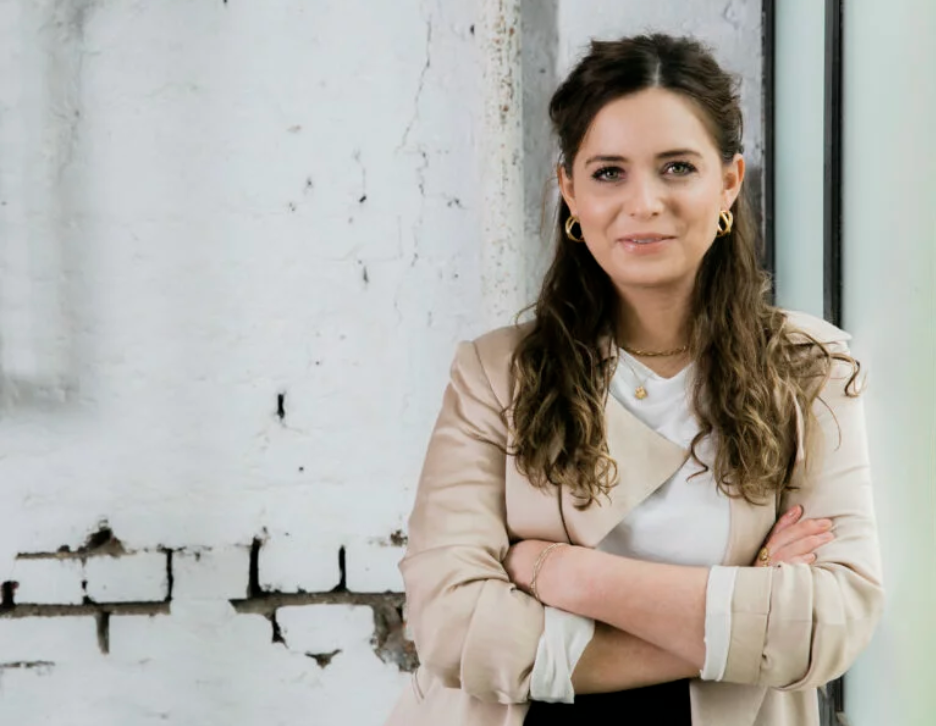

Quantum Companies Powering the Quantum renaissance
Exploring companies at the forefront of quantum technological advancements.

Quantum Cybersecurity Checklist: Safeguarding the Quantum Transition
Essentials of cybersecurity in a quantum world.

Government-Led Quantum Initiatives: Shaping the Quantum Future
Exploring strategic quantum initiatives led by governments.

Quantum Threats: The Flip Side of the Quantum renaissance
Navigating potential risks in the quantum domain.

Quantum Services: Bridging the Quantum Potential to Reality
Unveiling services in the quantum domain.

Optimize Quantum Circuits with AI-Powered Transpiler Passes
The Qiskit Transpiler Service beta release is now available on the IBM Quantum Premium Plan, providing users with AI and IBM cloud resources to speed up transpilation tasks.


Quantum Circuits Inc. Quietly Raises $33.5 Million
Quantum Circuits Inc. raised a $33.5 million extended Series C from major venture capital groups, including Sequoia Capital Partners. The funds will likely be used to expand the team and provide additional space in New Haven, as the company transitions from building quantum computers to finding customers.

AI’s Carbon Footprint is Bigger Than You Think
This article sheds light on how quantum technology and quantum computing can dramatically reduce the carbon footprint of AI and data centers, providing innovative solutions where the traditional approaches fall short. While the original article highlights concerns, it overlooks the groundbreaking potential of quantum advancements that can lead the way in sustainable AI development.

IBM wants to build a 100,000-qubit quantum computer
IBM aims to construct a 100,000-qubit quantum computer within the next decade, marking a significant leap from their current 433-qubit system. This ambitious project will involve partnerships with the University of Tokyo and the University of Chicago.

Quantum capital of the world: Emerging field that could solve ‘unsolvable’ problems
Illinois, under Gov. Pritzker's leadership, is positioning itself as the quantum capital of the world with significant investments in quantum technology. This initiative aims to address complex problems through quantum computing.

Quantum Working Groups Push for Near-Term Use Cases
Dive into the collaborative efforts of IBM's Quantum Working Groups as they aim to bring quantum computing closer to real-world applications. These groups focus on healthcare, materials science, high-energy physics, optimization, and sustainability, seeking to leverage quantum algorithms for tangible benefits.
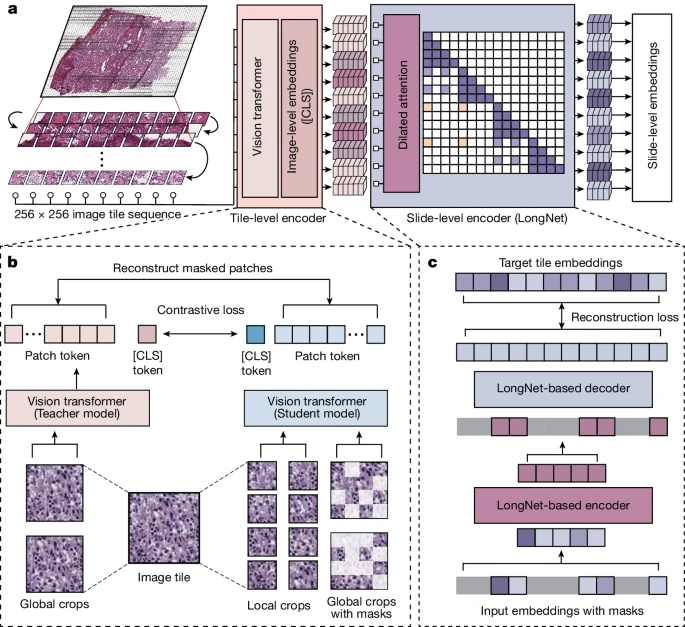
A Whole-Slide Foundation Model for Digital Pathology from Real-World Data
Explore the groundbreaking Prov-GigaPath, a whole-slide pathology foundation model renaissanceizing digital pathology with state-of-the-art performance. Trained on over a billion image tiles, this model is set to transform cancer diagnostics and more.
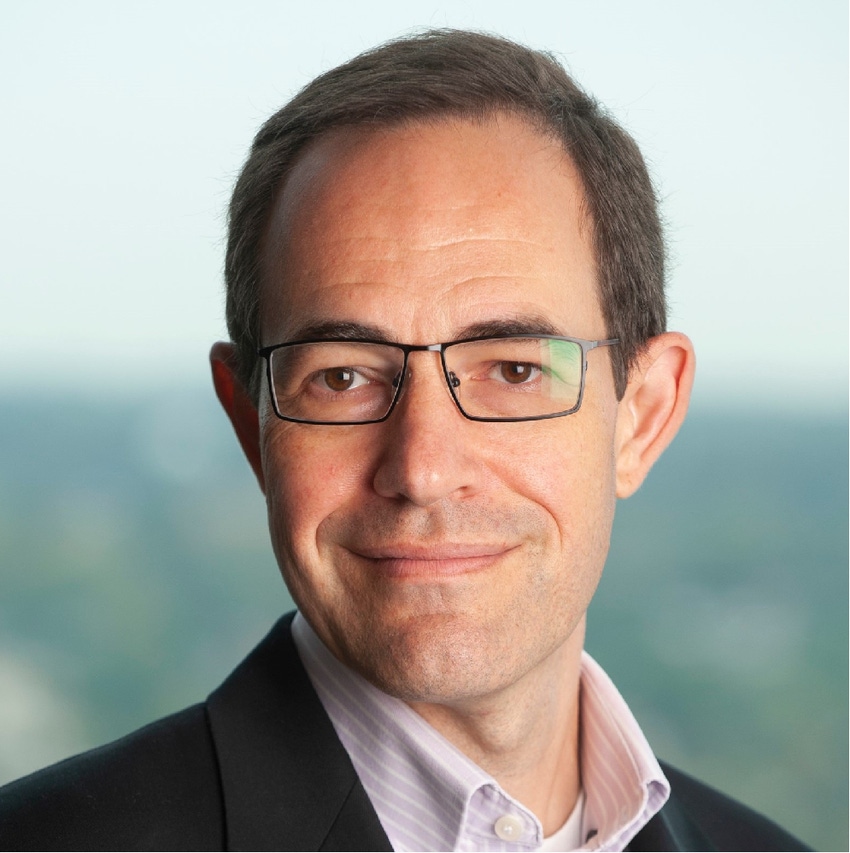
Deloitte Aids World Economic Forum on Quantum: Q&A
Delve into the pivotal collaboration between Deloitte and the World Economic Forum (WEF) on quantum computing's global stage. Scott Buchholz, Deloitte's global quantum computing lead, discusses their advisory role, exploring quantum's potential in solving complex business and societal problems while gearing up for the impending quantum leap.

Colorado and Illinois Set Their Sights on Becoming the Nations Quantum Hub
Colorado and Illinois are fiercely competing to secure a significant portion of federal funds under the Chips Act to become the leading quantum computing hubs in the United States. Both states have ambitious plans to foster innovation, attract quantum companies, and build a skilled workforce in the burgeoning field of quantum computing.

Understanding the Software Stack in Quantum Computing
Dive deep into the intricate layers of the quantum computing software stack, from high-level programming languages to quantum error correction software. Explore how these technological stacks translate complex quantum algorithms into tangible tasks that can be executed on real quantum hardware, elucidating the path from quantum science to practical applications.

Intel Progresses Toward Practical Quantum Computing
Intel has made significant advancements toward developing practical quantum computing by perfecting the scalability of silicon spin-based quantum processors. This progress could pave the way for fault-tolerant quantum computers, which are essential for real-world applications.

NVIDIA Accelerates Quantum Computing Centers Worldwide With CUDA-Q Platform
NVIDIA announces a major expansion in quantum computing capabilities globally by deploying its CUDA-Q platform in supercomputing centers across Germany, Japan, and Poland. This strategic move integrates quantum processors with classical supercomputing to advance research in AI, energy, and biology.
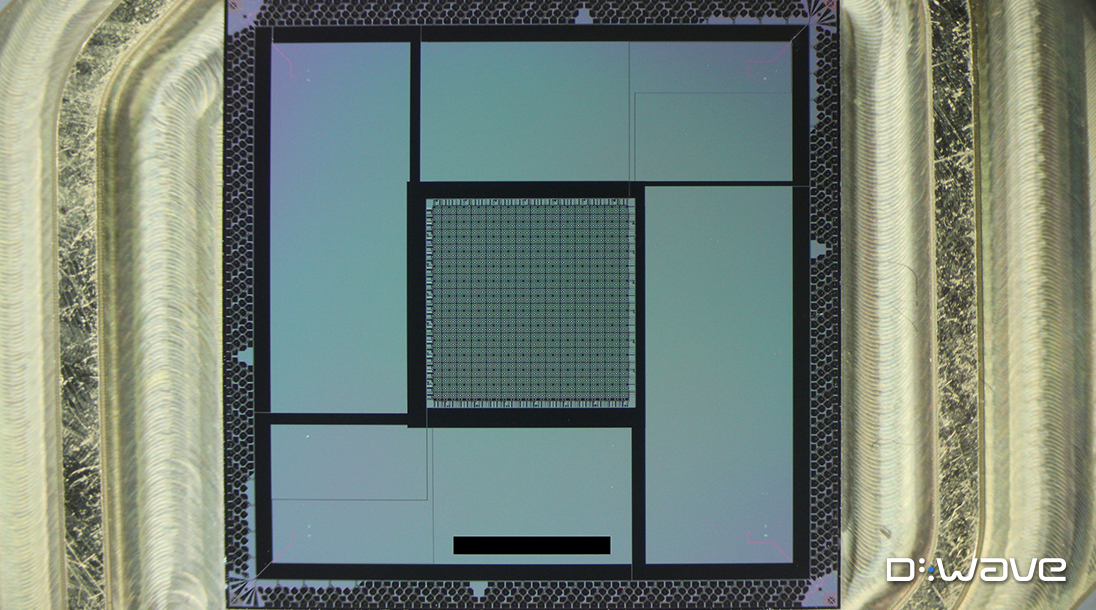
D-Wave and the University of Southern California Renew Multiyear Agreement to Advance Annealing Quantum Computing Research and Adoption
D-Wave and USC reaffirm their commitment to advancing quantum computing technology by renewing their partnership to house the Advantage system, accelerating research and practical applications in AI, logistics, and more.
Bridging the quantum gap: The Coding School and SandboxAQ launch quantum education and career exploration bootcamp
The Coding School, in partnership with SandboxAQ, launches a quantum education bootcamp aimed at empowering students from Minority Serving Institutions with quantum computing skills and career exploration opportunities. This initiative seeks to diversify the quantum workforce and provide equitable access to cutting-edge technology.

How states can take a quantum leap in economic development
State governments are exploring quantum technology as a new frontier for economic growth, driven by its potential impacts on jobs, economy, and society. With quantum computing poised to renaissanceize industries from cybersecurity to medicine, states like Colorado and Illinois are pioneering efforts to harness this advanced technology for regional development.

DOE Awards $7B for Innovative Quantum Projects
The U.S. Department of Energy (DOE) has awarded $7 B to advance practical quantum computers and develop commercial quantum-powered bioimaging. These awards, part of the Phase II Small Business Innovation Research (SBIR) and Small Business Technology Transfer (STTR) programs, highlight the government's commitment to fostering innovation in the quantum computing field.

Quantum Machines Controllers Power The Quantum Computing Lab At SKKU, Seoul
The Quantum Computing lab of the Advanced Institute of Nano Technology at Sungkyunkwan University (SKKU) in Seoul will deploy three of Quantum Machines advanced OPX1000 controllers. This represents a significant upgrade to the centers on-site research facilities, furthering South Korea's ambitious national project aimed at advancing the countrys quantum computing capabilities.
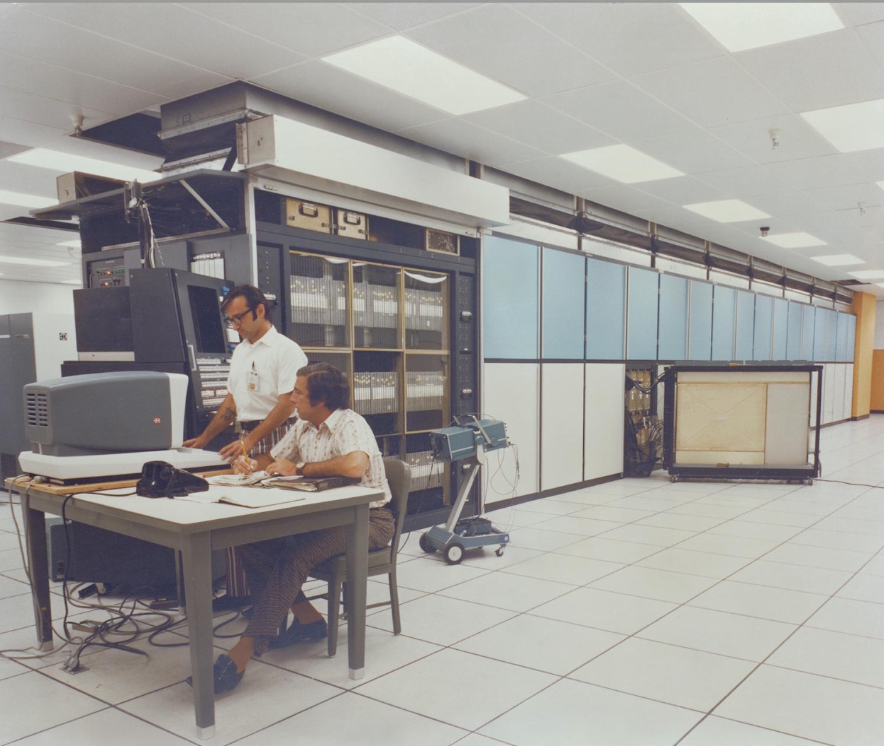

Worlds Purest Silicon Brings Scaling Up Quantum Computers Closer
Scientists have developed an ultra-pure form of silicon, paving the way for high-performance qubit devices and scalable quantum computers. This breakthrough by researchers at The University of Manchester and the University of Melbourne involves engineering silicon to remove silicon 29 and 30 isotopes, significantly enhancing its suitability for quantum computing.

IBM's Quantum Patents Showcase Innovative Solutions and Inspire Third-Party Inventions
IBM, America's most prolific patent holder in 2023, is seeing a growing number of its patents in the field of quantum information science. These patents cover various aspects of quantum computing, from chip assembly to synchronizing physical and virtual environments using quantum entanglement. Additionally, IBM's quantum technology is inspiring and enabling other firms and individuals to create their own quantum-related inventions.

Quantum Computing Receives Massive Government Funding Boost as Australia and Japan Invest in PsiQuantum and QuEra
In a significant development for the quantum computing industry, PsiQuantum and QuEra have been awarded substantial funding from the Australian and Japanese governments, respectively. This influx of government money into private quantum firms highlights the growing importance of quantum technology and the need for long-term, coordinated investments to achieve practical quantum advantage.

The Quantum renaissance Is Near: A Call for Congressional Action to Secure U.S. Leadership
As the quantum renaissance looms on the horizon, the United States must act swiftly to secure its position at the forefront of this transformative technology. Congress should pass the National Quantum Initiative Reauthorization Act to support research, secure supply chains, and promote the commercialization of quantum applications.

Quantum Computing: A Potential Solution to Baltimore's Traffic Woes Following Key Bridge Collapse
In the wake of the devastating Francis Scott Key Bridge collapse, Baltimore faces severe traffic congestion. Experts suggest that quantum computing could help optimize traffic flow and ease the burden on commuters and businesses, with both the government and private sector exploring this cutting-edge technology.

Quantum-Powered Logistics Management: Transforming Supply Chain Optimization
Discover how quantum computing is renaissanceizing logistics management, enabling companies to tackle complex optimization problems, cut operating costs, and enhance efficiency in today's competitive global marketplace. D-Wave's e-book explores real-world success stories and the unique advantages of quantum computing in supply chain optimization.

Pritzker 2019s $20 Billion Bet: Illinois to Become Quantum Computing Hub with PsiQuantums Industrial-Scale Project
Illinois Governor J.B. Pritzker is championing a $20 billion initiative to create a 150-acre quantum computing campus in Chicago, in partnership with PsiQuantum. This project aims to establish Illinois as a quantum computing hub, potentially renaissanceizing sectors from healthcare to climate science.

Nvidia supercomputer in Japan will be joined by quantum computer
A planned Nvidia-powered supercomputer in Japan will be getting a quantum computer as a roommate. The supercomputer, dubbed ABCI-Q, will be constructed by Fujitsu for Japans National Institute of Advanced Industrial Science and Technology (AIST). It will be powered by more than 2,000 Nvidia H100 Tensor Core GPUs in over 500 nodes interconnected by Nvidias Quantum-2 InfiniBand technology.

Steady progress in approaching the quantum advantage
Explore the latest developments in quantum technology with the third annual Quantum Technology Monitor from McKinsey. Discover how sectors like chemicals, life sciences, finance, and mobility are poised to benefit from advances in quantum computing, potentially unlocking $2 trillion in value by 2035.

Drug design on quantum computers
This article explores the promising application of quantum computers in drug design, highlighting the potential for significant advancements in quantum chemical calculations critical for computational drug discovery.

The UKs space economy soars to newer heights, propelled by growing government support for emerging technologies like quantum computing.
The UK's space economy is experiencing accelerated growth due to increasing government support for emerging technologies, including quantum computing. This growth is evidenced by ventures like Space Forge, which develops novel manufacturing processes in space, and Eutelsat Group, a leading satellite operator.

Quantum Computing for Transportation and Logistics
QED-Cs Use Cases Technical Advisory Committee presents a study exploring the application of quantum computing in transportation and logistics. The study highlights potential enhancements in supply chain optimization, route planning, and overall efficiency gains across the transportation sectors.

ICOSA And NEC Present Quantum-Inspired Solution For Financial Markets
ICOSA and NEC have developed Vector Annealing (VA), a quantum-inspired computing method that significantly accelerates solution finding in financial portfolio optimization, leveraging Markowitzs Modern Portfolio Theory for enhanced performance over traditional methods.

ORNL-Supported Research Team Enlists Quantinuum Quantum Computer To Make Real Progress On Quantum Simulation
A research team supported by Oak Ridge National Laboratory (ORNL) has utilized Quantinuums H1-1 quantum computer to simulate complex quantum states, potentially surpassing classical computing capabilities with 70 qubits. This advancement marks a significant step in quantum computing, targeting practical applications in modeling complex systems.

Quantum technology sees record investments, progress on talent gap
Investors buoy established quantum start-ups as technological progress continues, though at a slower pace, and more academic institutions offer quantum programs. This analysis highlights the industrys evolution and the narrowing talent gap.

Five lessons from AI on closing quantums talent gap before its too late
This article outlines five critical lessons learned from AI talent strategies that can be applied to address the quantum technology talent gap. It highlights the need for clear talent definitions, investment in translators, creation of diverse pathways, building technology literacy, and developing talent strategies to ensure a robust quantum workforce.

Quantum computing use cases are getting real what you need to know
This report provides a comprehensive overview of the rapidly evolving quantum computing ecosystem, highlighting emerging business use cases and the potential significant value for industries prepared to embrace this technology.

UK Tightens Controls On Quantum Computing Exports And Cryogenics Firms Could Feel The Chill
The UK government is set to enhance scrutiny on the export of cryogenic equipment essential for quantum computing, aiming to prevent potential military misuse and safeguard against economic vulnerabilities. This move could significantly impact cryogenics firms, central to quantum technology development.

Early quantum computing investors see benefits
Explore the pioneering stages of quantum computing with insights into its potential to renaissanceize technology, from cracking online encryption to modeling new molecules. This Financial Times article provides an overview of current developments and early applications of quantum computing technology in various sectors.

Energy Dept joins industry partners in space for quantum technology
The Energy Department Quantum and Space Collaboration project aims to harness cutting-edge quantum technologies for pivotal advancements in space. This initiative includes a focus on quantum computing, quantum sensing for imaging, position navigation and timing, and quantum secure communications. The project aims to leverage the unique properties of quantum technologies in the low-gravity environment of space to enhance communications, sensing, and computational capabilities.

Using quantum computing to lead the next technology renaissance
Government continues to be a catalyst, not just through R&D, but in using emerging tech to operate complex systems. Deloitte highlights the impact of quantum and quantum-hybrid solutions in solving current problems, promising significant advancements in public sector applications.

Quantum Kernels Can Solve Machine Learning Problems That Are Hard for All Classical Methods
IBM researchers have demonstrated a quantum advantage in machine learning, revealing that quantum kernels can identify patterns in data sets that appear as random noise to classical computers, offering a new pathway for quantum machine learning.

A Tweezer Array with 6100 Highly Coherent Atomic Qubits
Explore the renaissanceary impact of a large-scale optical tweezer array on quantum computing, simulation, and metrology, featuring over 6,100 atomic qubits for unprecedented precision and scalability.

Utilizing Quantum Computing in the Construction Industry
Explore the renaissanceary potential of quantum computing in the construction sector, from enhancing surveying accuracy to accelerating project completion.

Quantum Computing: renaissanceizing the Construction Industry
Discover how quantum computing is transforming the construction industry by enabling rapid work, optimizing processes, and improving quality.
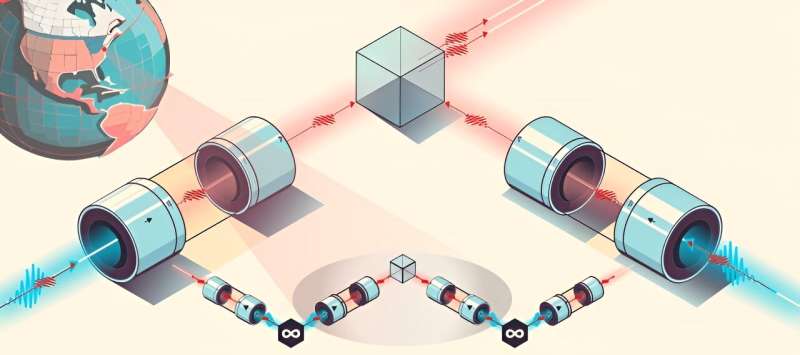
Research team takes a fundamental step toward a functioning quantum internet
Unlocking the Quantum Internet: A Leap Forward by Stony Brook University is a captivating blog post discussing a recent breakthrough by Stony Brook University's research team in quantum computing. This post delves into the team's significant advancement towards a functioning quantum internet. By demonstrating a foundational quantum network measurement using room-temperature quantum memories, the team has paved the way for more secure, efficient communication networks and powerful scientific algorithms. This milestone is a critical step in realizing the dream of a quantum internet, showcasing the potential to renaissanceize our approach to data transmission and processing.

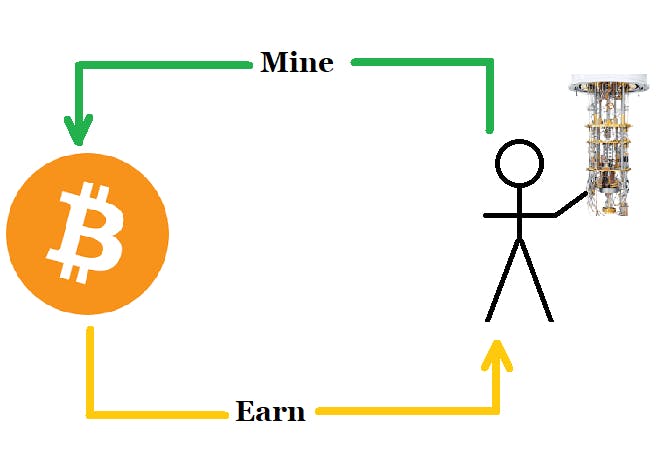
Hash Rate Analysis Projections: Why Bitcoin Should Embrace Quantum Information Science
exploring the current challenges faced by quantum information scientists in securing funding and the eventual superiority of quantum processing units (QPUs) over traditional ASICs and GPUs. The article delves into the idea of Bitcoin as a quantum mechanical computational system and the implications of quantum computing in the realm of cryptocurrencies.

Q-CTRL Partners with USGS to Pioneer Quantum Sensing and Computing Applications
LOS ANGELES, January 16, 2024 - In a significant advancement for geophysics with resource exploration impacts, Q-CTRL, a global leader in developing useful quantum technologies through quantum control infrastructure software, has entered a pioneering partnership with the United States Geological Survey (USGS) to explore potential quantum computing and sensing applications for geological sciences.
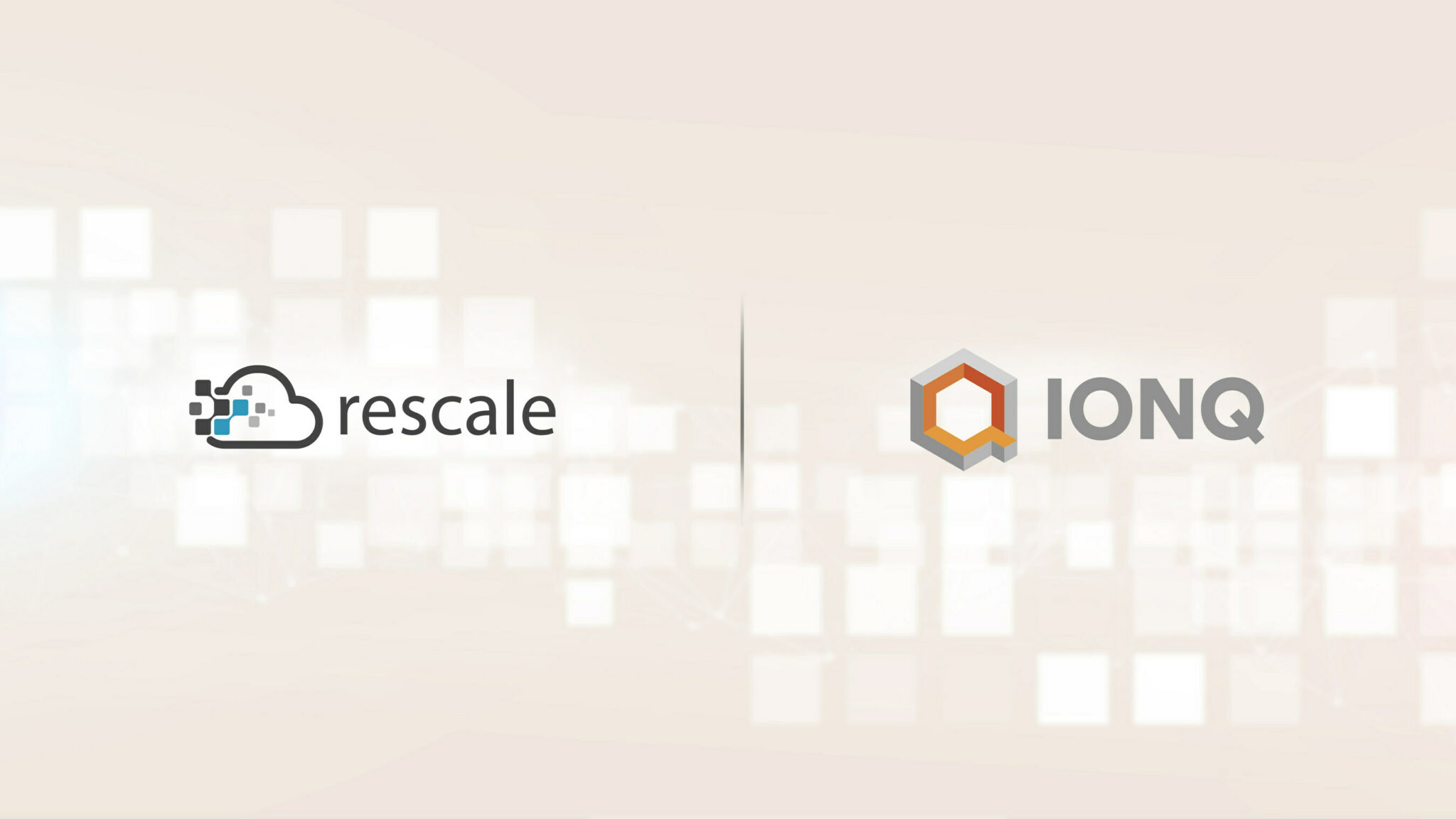
Rescale, IonQ Launch Partnership To Accelerate Hybrid Quantum Computing
PRESS RELEASE Following the 2024 Annual Meeting of the World Economic Forum in Davos, Rescale, the leader in high performance computing (HPC) built for the cloud to accelerate engineering innovation and scientific discovery, announced it is teaming with quantum computing leader IonQ to merge the raw processing power of accelerated cloud computing with the unique problem-solving potential of quantum computing. This partnership forges a new path to tackle the most intricate challenges facing product development, healthcare, life sciences, financial services, materials research, logistics optimization, and national research labs.
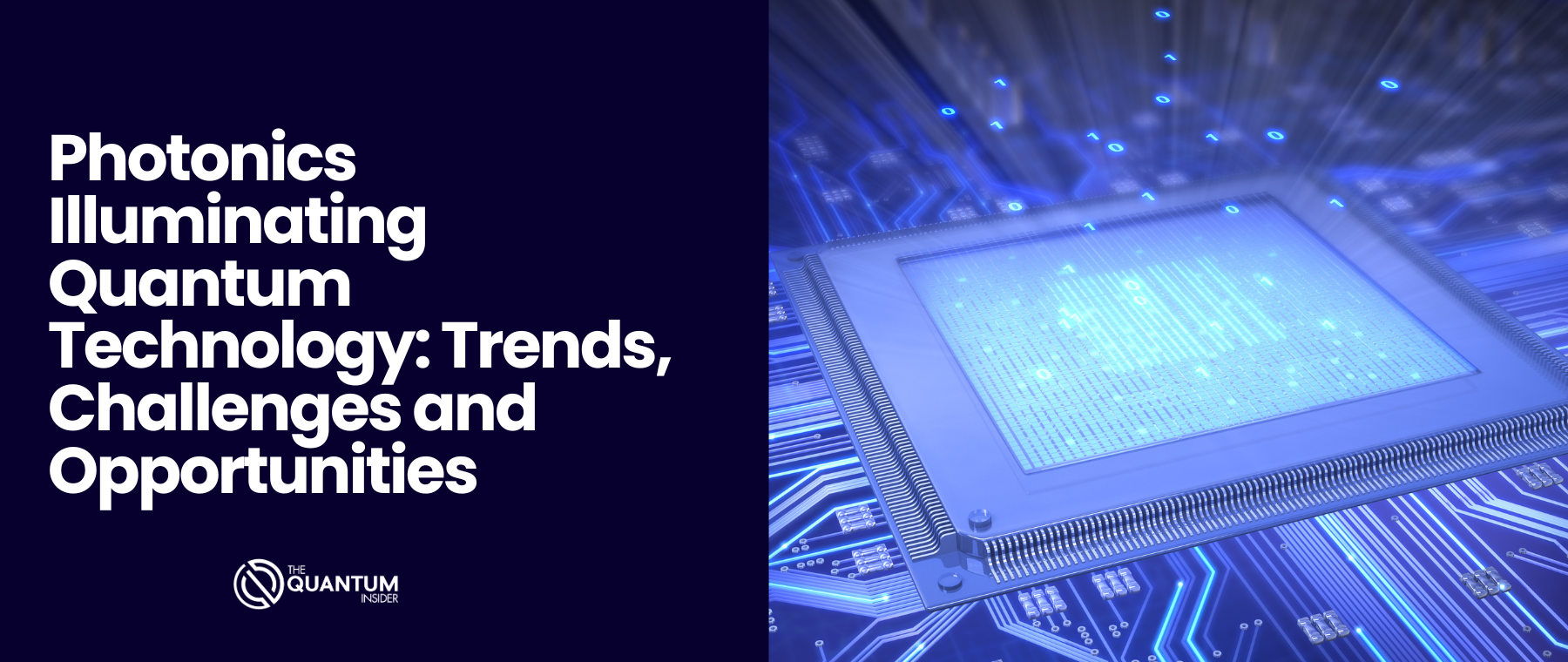
TQI Exclusive: Photonics Illuminating Quantum Technology: Trends, Challenges And Opportunities
There is a very good chance you are thinking of the gold chandelier often found in a large dilution refrigerator that quantum computing players like IBM and Google use to cool and operate a superconducting qubit. However, there is one core technology that is often overlooked when we talk about quantum computers And thats photonics. Dr. Bob Sutor who spent more than two decades at IBM Research in New York working and leading IBMs efforts in quantum computing knows the large cyrostats very well. Currently Dr. Sutor is the vice president and chief quantum advocate at Infleqtion where at an event he stated:
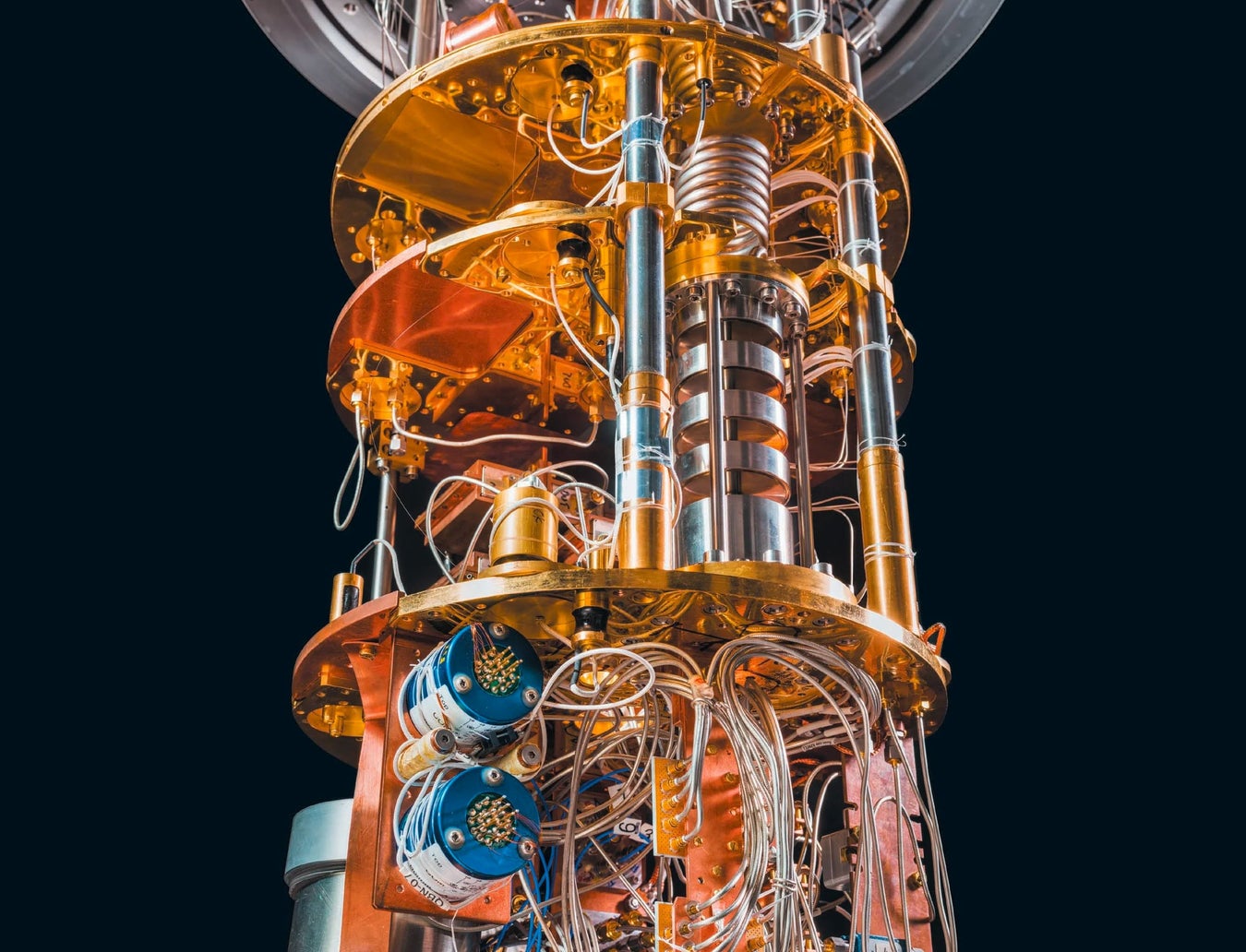
Tomorrows Quantum Computers Threaten Todays Secrets. Heres How to Protect Them
Digital security experts around the world have their eyes fixed on the Y2Q Years to Quantum clock. It ticks down the time until the projected date when a quantum computer will be able to break an essential form of modern cryptography. Called public-key cryptography because of its ingenious method of sharing secret codes in public, it keeps your credit card number safe when you shop online and ensures that your phone's software update is coming from the phone company and not a hacker. Whistleblowers use it to contact journalists, and businesses use it to send confidential files.
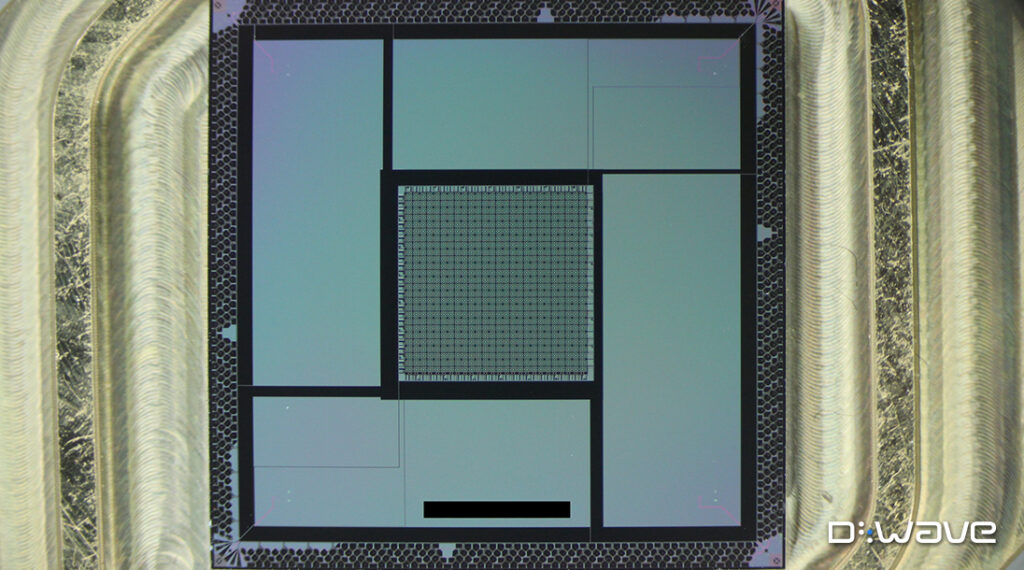
D-Wave Announces 1,200+ Qubit Advantage2 Prototype In New, Lower-Noise Fabrication Stack, Demonstrating 20x Faster Time-To-Solution On Important Class Of Hard Optimization Problems
PRESS RELEASE D-Wave Quantum Inc. (NYSE: QBTS) (D-Wave), a leader in quantum computing systems, software, and services and the worlds first commercial supplier of quantum computers, today announced it has calibrated a 1,200+ qubit Advantage2 prototype, which will soon be available in the companys Leap real-time quantum cloud service. Developed with a new lower-noise, multilayer superconducting integrated-circuit fabrication stack, the new Advantage2 prototype demonstrates significant performance gains on hard optimization problems and is expected to be particularly powerful for new use cases such as machine learning. The new Advantage2 prototype features 1,200+ qubits and 10,000+ couplers, double the number of qubits and couplers over the previously released Advantage2 prototype. Benchmarks demonstrate substantial advancements across a number of performance metrics compared to the Advantage quantum processing unit (QPU)

Quantum promises a bright future for the pharma industry
Quantum computing technology continues to advance closer to an everyday reality. While the potential applications of quantum in certain sectors are more speculative, the pharmaceutical industry is poised to be transformed by quantum technology.This sector is likely to be the fastest to unlock the benefits of quantum computing, once the technology is fully realized. But how ready are companies in this sector for this renaissance, and what changes can we expect?


Artificial Intelligence, Quantum Computing, and Space are 3 Tech areas to Watch in 2024
There will be a paradigm shift in quantum research, learning, and prediction in society that expands in 2024. A new data era known as quantum computing is beginning to emerge as we move past classical computing. Quantum computing is expected to change the field of data analytics and artificial intelligence, propelling humanity forward faster than ever before. The speed and power of quantum computing will enable us to address some of the most difficult problems facing humanity. Every month, quantum computing becomes closer and it is being used in practical ways.

World First As Stable Qubit For Quantum Computers Achieved At Room Temperature
Researchers have been able to achieve quantum coherence at room temperature this is the ability of a quantum system to maintain a well-defined state without being affected by external disturbances. This breakthrough is an important step forward in the development of quantum computers. It is easier to work with them if you do not have to cool them down to incredibly low temperatures.

First unhackable shopping transactions carried out on quantum internet
A secure exchange between a merchant and a buyer has been successfully tested as a proof of concept using a small quantum computing network in China. To shop on the unhackable quantum internet, we will need new security techniques. Though we do not have a fully operational quantum internet yet, researchers have now demonstrated a proof of concept for secure quantum e-commerce. Hua-Lei Yin at Renmin University of China and his colleague built a small network from five quantum computers connected with several kilometres of fibre. This worked as all quantum networks do, by tweaking the quantum properties of light

Demystifying Quantum Computing: A Laymans Guide to the Future of Technology
Potential Impact on Technology: Now, lets go into the crystal ball and see how quantum computing could transform our technological world. The possibilities are astounding, ranging from supercharging sophisticated simulations to transforming cryptography. Have a clear picture of the potential discoveries that could radically alter the way we compute and analyze data.

Framework from MIT can help businesses anticipate when Quantum Computing might be useful
McKinsey estimates that 5,000 quantum computers will be operational by 2030, but that the hardware and software required to handle the most complex problems will not be available until 2035 or later. However, organizations must begin planning now for how they will use technology to solve real-world business problems. According to a November 2022 report, some companies expect to invest more than $15 million per year in quantum computing. A group of MIT researchers, in partnership with Accenture, has developed a framework to help tech-savvy executives start to evaluate the potential of quantum computing for problem-solving at their companies.

TQI Exclusive: Harvard And QuEra Scientists Say Shuttling Qubits, Parallelism May Power The Ride To Practical Quantum Computing
Whats really important is that if we keep making these devices bigger and bigger, we also need the performance to continue improving, in order for us to be able to realize some of these really complex algorithms, where each qubit is needed to be able to implement billions of gates, said Bluvstein. To be able to implement these billions of gates, we really need to start, now in the field, switching over to not only testing our algorithms with physical qubits and learning about how quantum algorithms work, but begin testing our algorithms with logical qubits. We need to determine how error-corrected algorithms work because we know that in order to, for example, solve really big problems, such as really big chemistry problems, we need things on the scale of more than a billion gates. And were never going to be able to achieve this with our physical qubits, so we need to focus on error-correcting algorithms

The 3 Best Quantum Computing Stocks to Buy in January 2024
- Intel (INTC): Intel may have lost ground to market leaders in the semiconductor market but is eyeing up a comeback with its own specialized quantum computing chip. - Honeywell (HON): Leading quantum computing firm Honeywell has grown a reputation from utilizing trapped-ion technology and establishing strategic acquisitions to become a key industry player. - D-Wave Quantum (QBTS): D-Wave is a unanimous buy from analysts thanks to its strengths in building annealing quantum computers.

MIT/Harvard spinout plans 10,000-qubit, error-corrected quantum computer by 2026
If successful, the startup could beat industry leaders IBM, Microsoft and Google to error-corrected quantum computing.

QuEra Computing Releases a Groundbreaking Roadmap for Advanced Error-Corrected Quantum Computers, Pioneering the Next Frontier in Quantum Innovation
Quantum error correction is critical to fulfill the immense promise of quantum computers. This advanced technique addresses the inherent fragility of quantum states and the susceptibility of qubits to interference from their environment, which can lead to errors in quantum computations. By implementing error correction protocols, quantum computers can maintain the integrity of quantum information over longer periods, enabling them to perform complex calculations that are beyond the reach of classical computers. This enhances the reliability and scalability of quantum systems and paves the way for groundbreaking advancements in fields ranging from materials science to drug discovery and optimization problems. By providing the first commercial error-corrected system, QuEra is setting a new bar in performance and usability.

Rigetti Computing Awarded Innovate UK Grant To Develop Quantum Machine Learning Techniques For Financial Data Streams
Financial institutions need to continuously interpret complex data streams to extract information necessary for providing accurate credit risk evaluation, managing market-making services, and predicting emissions in the context of green finance, among other things. Classical machine learning techniques used to assist and provide insights to these services have limitations as these data streams are, in general, complex. Combining quantum computing with classical machine learning methodology could offer more powerful resources for processing these data streams, given the potential for quantum computers to process some types of information more efficiently than with classical resources alone.

TQI Exclusive: Harvard And QuEra Scientists Say Shuttling Qubits, Parallelism May Power The Ride To Practical Quantum Computing
For a Harvard-led team of researchers, the solution to this challenge, relying on the natural strengths of the design of the neutral atom quantum computer, was to take a group of logical qubits on a train ride to what they called an entanglement zone, where they can perform calculations. Think of this approach as a quantum computational bullet train that brings these all-important qubits to their destination together.

Google wants to solve tricky physics problems with quantum computers
Researchers at Google have created an algorithm that can translate complex physical problems into the language of quantum mechanics, which could make quantum computers able to tackle more tasks.

The need for post-quantum cryptography in the quantum decade
While quantum computing can positively serve humanity in a myriad of ways, it also brings concerning cybersecurity threats. In turn, the U.S. government and security leaders have called for accelerated post-quantum cryptography (PQC) migration. President Biden signed the Quantum Computing Cybersecurity Preparedness Act after visiting IBMs quantum data center in October 2022. In addition, NIST, CISA, and NSA recently advised organizations to develop PQC readiness roadmaps.

POLARISqb And Scientist.Com Partner To Offer Online Access To Quantum-Aided Drug Design
POLARISqb was the first company to develop a drug discovery platform that utilizes the well-documented optimization power of todays quantum computers, stated Bill Shipman, CTO and Co-Founder of POLARISqb. We look forward to working with the team at Scientist.com to make this platform available to their vast network of scientists and researchers, who can use our tools to accelerate the search for novel drug candidates. POLARISqb uses quantum annealing computers that complete calculations more than 500x faster than conventional computers

Room-temperature quantum coherence of entangled multiexcitons in a metal-organic framework
Singlet fission can generate an exchange-coupled quintet triplet pair state 5TT, which could lead to the realization of quantum computing and quantum sensing using entangled multiple qubits even at room temperature. However, the observation of the quantum coherence of 5TT has been limited to cryogenic temperatures, and the fundamental question is what kind of material design will enable its room-temperature quantum coherence.
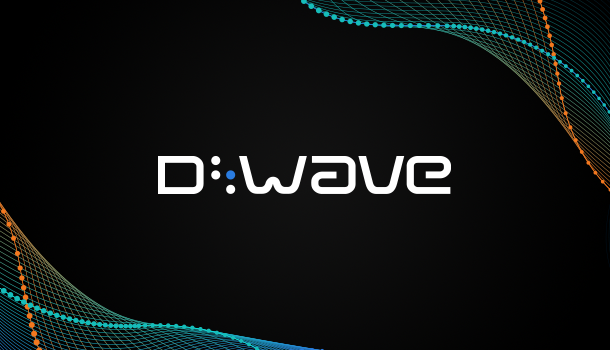
D-Wave Stands Ready To Support New U.S. Law Creating Pilot Program On Near-Term Quantum Computing Applications
PALO ALTO, Calif., BURNABY, B.C., --- December 26, 2023 -- D-Wave Quantum Inc. (NYSE: QBTS), a leader in quantum computing systems, software, and services and the worlds first commercial supplier of quantum computers, commends U.S. policy makers for including a quantum pilot program focused on near-term quantum computing applications in the National Defense Authorization Act (NDAA) that was passed by Congress and signed into law by President Biden on December 22, 2023.
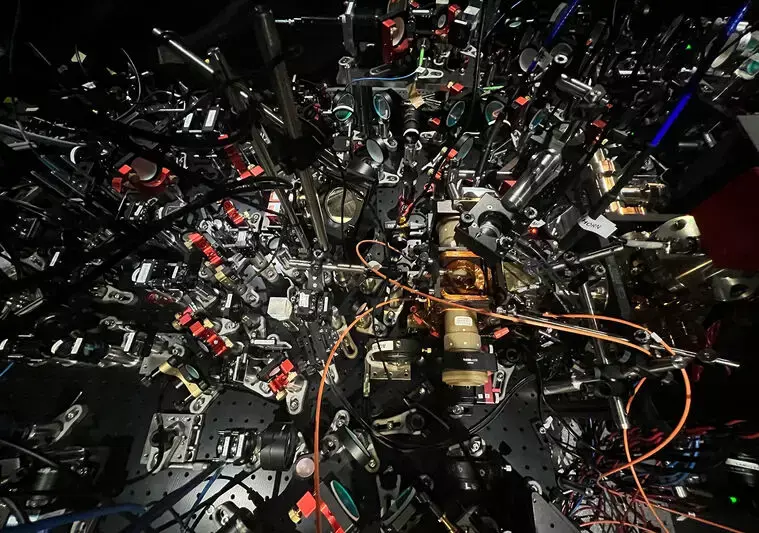
DARPA RESEARCH LEADS TO GROUNDBREAKING DISCOVERY IN QUANTUM COMPUTING, DEVELOPING THE WORLDS FIRST LOGICAL QUBIT CIRCUIT
Researchers working with the Optimization with Noisy Intermediate-Scale Quantum (ONISQ) program say they have created the worlds first quantum circuit using logical quantum bits (qubits). The innovation marks a significant stride towards fault-tolerant quantum computing, promising to renaissanceize the design of quantum computer processors.
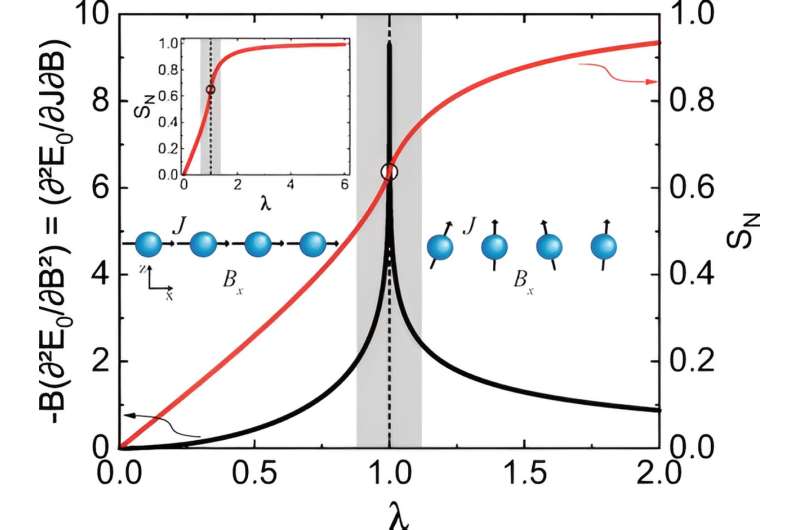
Researchers propose conditions for maximizing quantum entanglement
Entanglement is a property of quantum physics that is manifested when two or more systems interact in such a way that their quantum states cannot be described independently. In the terminology of quantum physics, they are said to be entangled, i.e. strongly correlated. Entanglement is of paramount importance to quantum computing. The greater the entanglement, the more optimized and efficient the quantum computer.
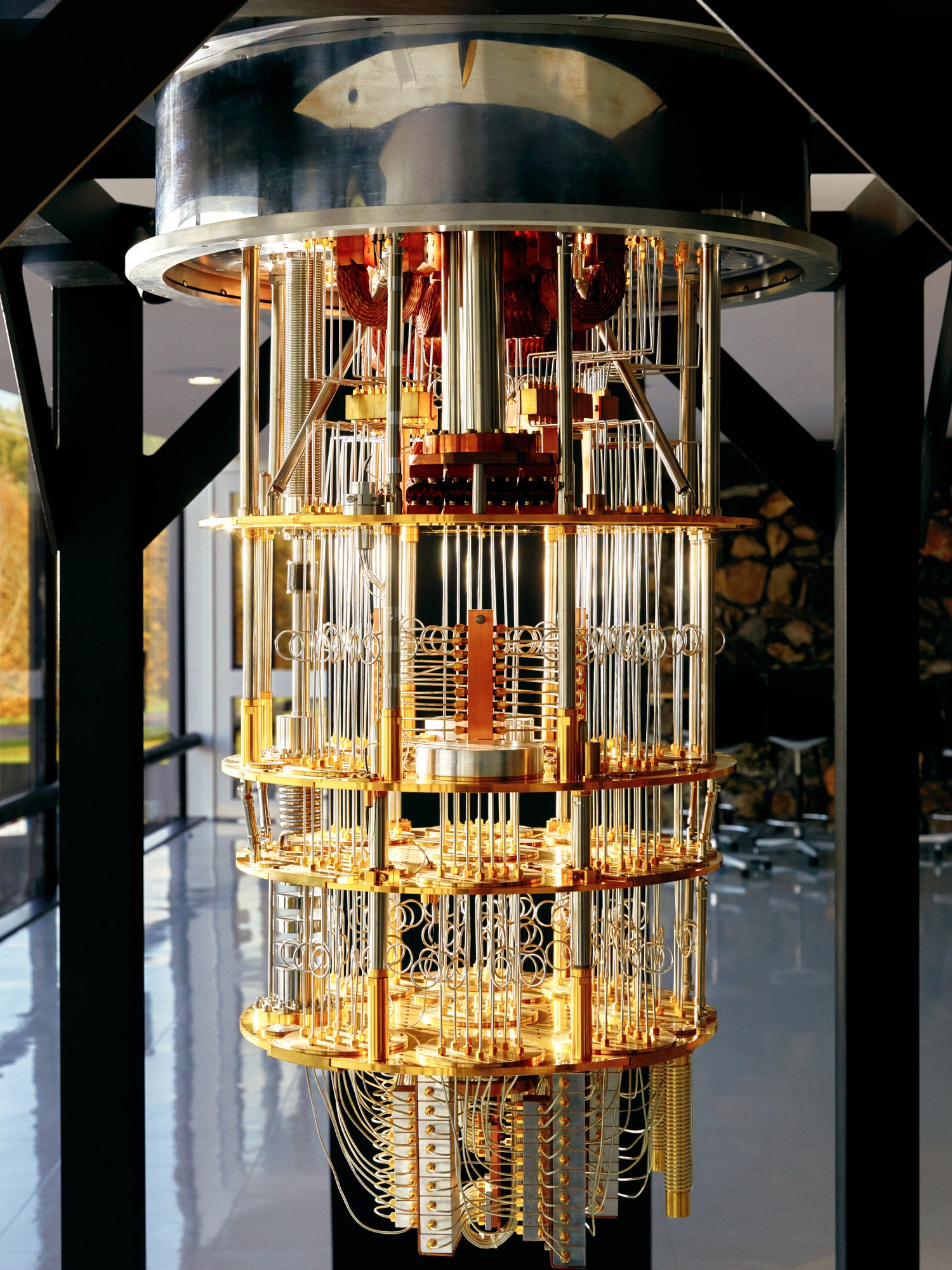
Quantum computing is taking on its biggest challenge: noise
For a while researchers thought theyd have to make do with noisy, error-prone systems, at least in the near term. Thats starting to change.

Quantum Computing and Its Promise for the Future of Space
Space exploration has always embodied the pursuit of the extraordinary and unknown. From the launch of the first satellite to the exploration of distant planets, humanity's venture into space has consistently pushed the boundaries of technology, and now, one of the most renaissanceary technological frontiers on the horizon is quantum computing. This vital field can reshape the landscape of space exploration, potentially unlocking new realms of possibility in space-related research and technology.

How Can SMEs Prepare For The Quantum Computing Era?
The idea of quantum computing, once relegated to academic circles and science fiction novels, has now migrated to the tech media, and now is headed toward mainstream media outlets, like 60 Minutes. While its impossible to predict how technologies or if technologies are adopted, its evident that quantum technology is here, and it seems poised to renaissanceize everything from drug discovery to materials science.

Quantum computing in business applications
Quantum computing shows great potential for faster problem-solving, among other benefits. Discover key areas where the enterprise could implement the rapidly advancing tech.

Quantum Computing And Chill? NISQRC Algorithm Could Allow QCs To Take On Streaming Data
Researchers have achieved a significant advance in real-time quantum computing with the development of Noisy Intermediate Scale Quantum Reservoir Computing, NISQRC, according to a study posted on the pre-print server ArXiv. This novel algorithm enables quantum machines to learn from continuously flowing data streams, overcoming a major hurdle that has previously limited their applicability to dynamic real-world scenarios.

D-Wave Stands Ready To Support New U.S. Law Creating Pilot Program On Near-Term Quantum Computing Applications
The pilot program aims to build and mature demonstrations, proof of concepts (POCs), and pilots using all viable quantum computing systems ensuring that the U.S. Defense department is using the best available technology to achieve mission objectives. D-Wave has already developed demos, POCs, and applications for other governments and businesses around the world to solve optimization challenges and has the technology that is necessary to begin working with the U.S
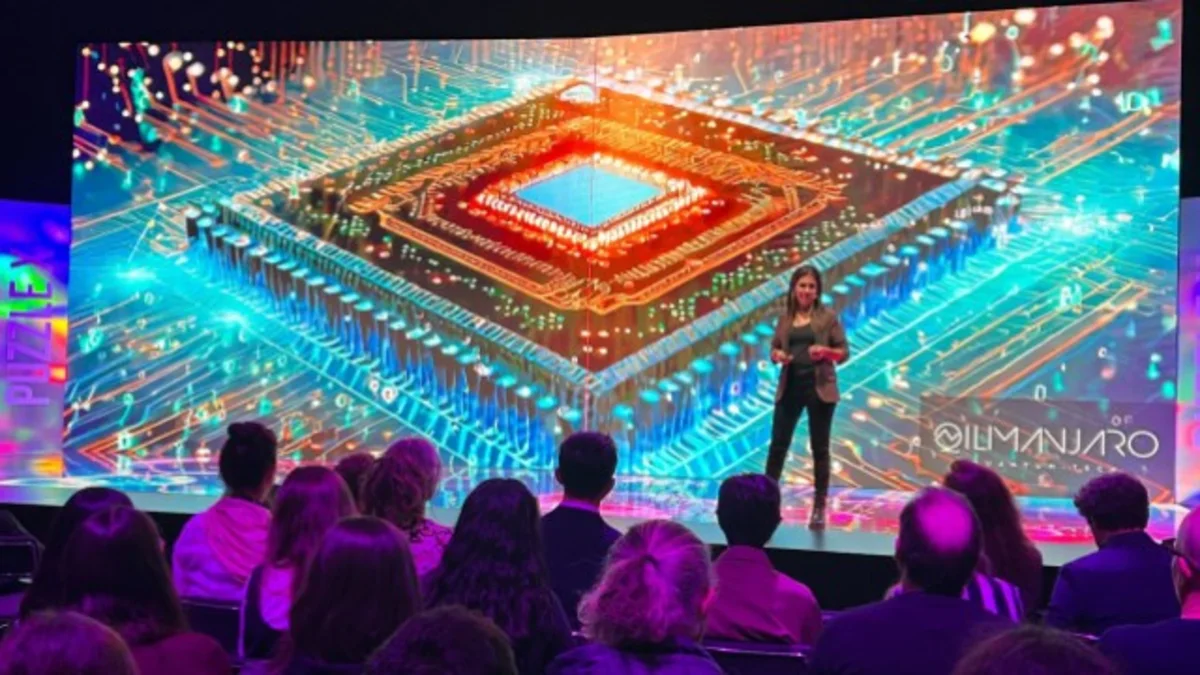
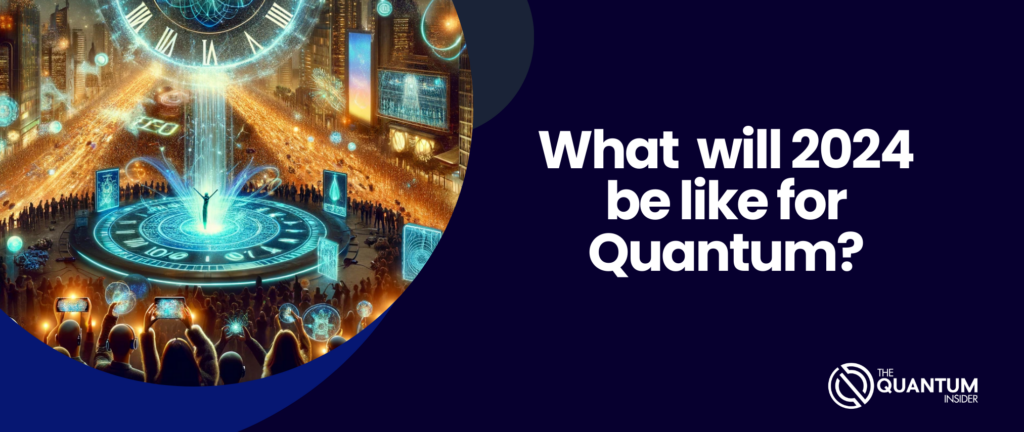

Four ways to prepare for quantum-proof encryption
Quantum computing, with its ability to run millions of calculations in a fraction of the time as traditional binary code, poses a real threat to todays most widely used encryption algorithms.

Imagining the Future of Quantum Computing for Space
Space is one of the sectors that could benefit from experimenting with and adopting cutting-edge quantum technologies. This article explores the applications of quantum technologies for space.

2024 will be the year when quantum computing becomes an increasingly tangible and accessible technology
See OQC CTO Simon Phillips prediction on what to expect for #Quantum in 2024, in UKTN's latest article:


Interested in acquiring valuable skills for programming quantum computers, but have questions before you commit to our Quantum Programming Core Training
How can you or your business benefit from training? What makes D-Waves training unique? What can you learn in the course? Do you need any qualifications? Learn more about our quantum training course with D-Wave's Senior Manager of Learning Solutions, Kelly Novic. Upgrade your career, find business opportunities, or train your IT team to kick start your quantum journey today!


Quantum computers will fundamentally change the way we think about cryptography. Learn how researchers and security experts at GitHub, Microsoft, and Santander used CodeQL to generate a Cryptographic BoM, to better prepare for the age of quantum computing.
When you hear the words, quantum computing, it sounds like something out of a science fiction movie. Yet in recent years, quantum computing has become a hot topic, especially in the world of cryptography. Post-quantum cryptography raises many questions and challenges, and a group of researchers and security experts across GitHub, Santander, and Microsoft came together to start trying to tackle them. They started with a question: how do you understand how cryptography is used and implemented, whether it be on-prem or in the cloud, across hundreds of thousands if not millions of lines of code?
Last week we announced that our performance-management software is integrated with IBM Quantum services. Now, you can use this option to get maximum value from 127-qubit devices!
Building on last weeks exciting announcement, were thrilled to announce that Q-CTRLs performance management is now available for you to use on the 127-qubit IBM Brisbane processor through the IBM Quantum Pay-As-You-Go plan. By expanding to larger devices, you can build utility-scale applications and push the limits of what quantum computers can do, as we usher in the era of quantum utility.
Lots of exciting news about neutral atom QCs today! Unsure what these systems are? We've got you covered. Check out our demo from earlier this year
In the last few years, a new quantum technology has gained the attention of the quantum computing community. Thanks to recent developments in optical-tweezer technology, neutral atoms can be used as robust and versatile qubits. In 2022, a collaboration between QuEra and various academic institutions produced a neutral-atom device with a whopping 256 qubits! It is no surprise that this family of devices has gained traction in the private sector, with startups such as Pasqal, QuEra, and Atom Computing suddenly finding themselves in the headlines.

IBM's new Condor quantum computer
IBM's new Condor quantum computer is only the second ever to have more than 1000 qubits

How can we simulate nuclear physics on a quantum computer?
Quantum computers offer the potential to simulate nuclear processes that are classically intractable. With the goal of understanding the necessary quantum resources, we employ state-of-the-art Hamiltonian-simulation methods, and conduct a thorough algorithmic analysis, to estimate the qubit and gate costs to simulate low-energy effective field theories (EFTs) of nuclear physics.
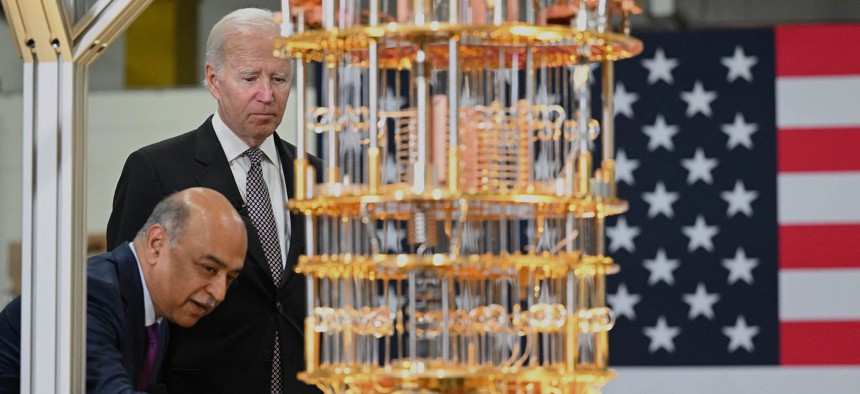
DoD offices within the Navy and Air Force are recognizing the importance of post-quantum cryptography as mission critical
DoD offices within the Navy and Air Force are recognizing the importance of post-quantum cryptography as mission critical as they look to both safeguard systems and harness the benefits of quantum computing.
60 Minutes Quantum Computing
Google, IBM make strides toward quantum computers that may renaissanceize problem solving
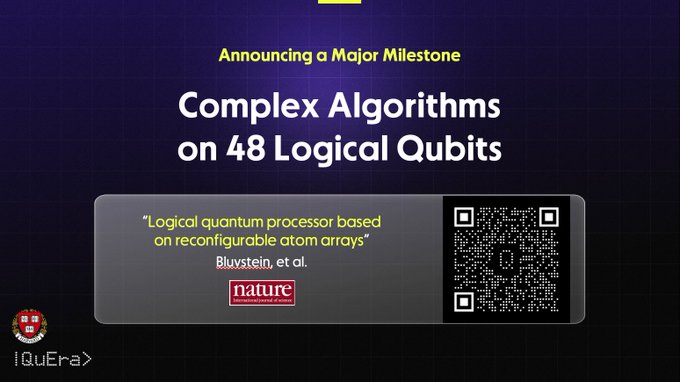
Harvard, QuEra, MIT, and the NIST/University of Maryland Usher in New Era of Quantum Computing by Performing Complex, Error-Corrected Quantum Algorithms on 48 Logical Qubits
BOSTON, MASSACHUSETTS, December 6, 2023 QuEra Computing, the leader in neutral-atom quantum computers, today announced a significant breakthrough published in the scientific journal Nature. In experiments led by Harvard University in close collaboration with QuEra Computing, MIT, and NIST/UMD, researchers successfully executed large-scale algorithms on an error-corrected quantum computer with 48 logical qubits and hundreds of entangling logical operations. This advancement, a significant leap in quantum computing, sets the stage for developing truly scalable and fault-tolerant quantum computers that could solve practical classically intractable problems.

More on Logical Qubit Study: DARPA-Funded Research Leads to Quantum Computing Advance
Critical Quote: The homogeneity of Rydberg qubits allows them to scale rapidly and also allows them to be manipulated and moved around easily using lasers on a quantum circuit. This overcomes the current error-prone methods of performing qubit operations by having to connect them sequentially, which propagates errors throughout the chip. Dr. Mukund Vengalattore, ONISQ program manager, DARPAs Defense Sciences Office.
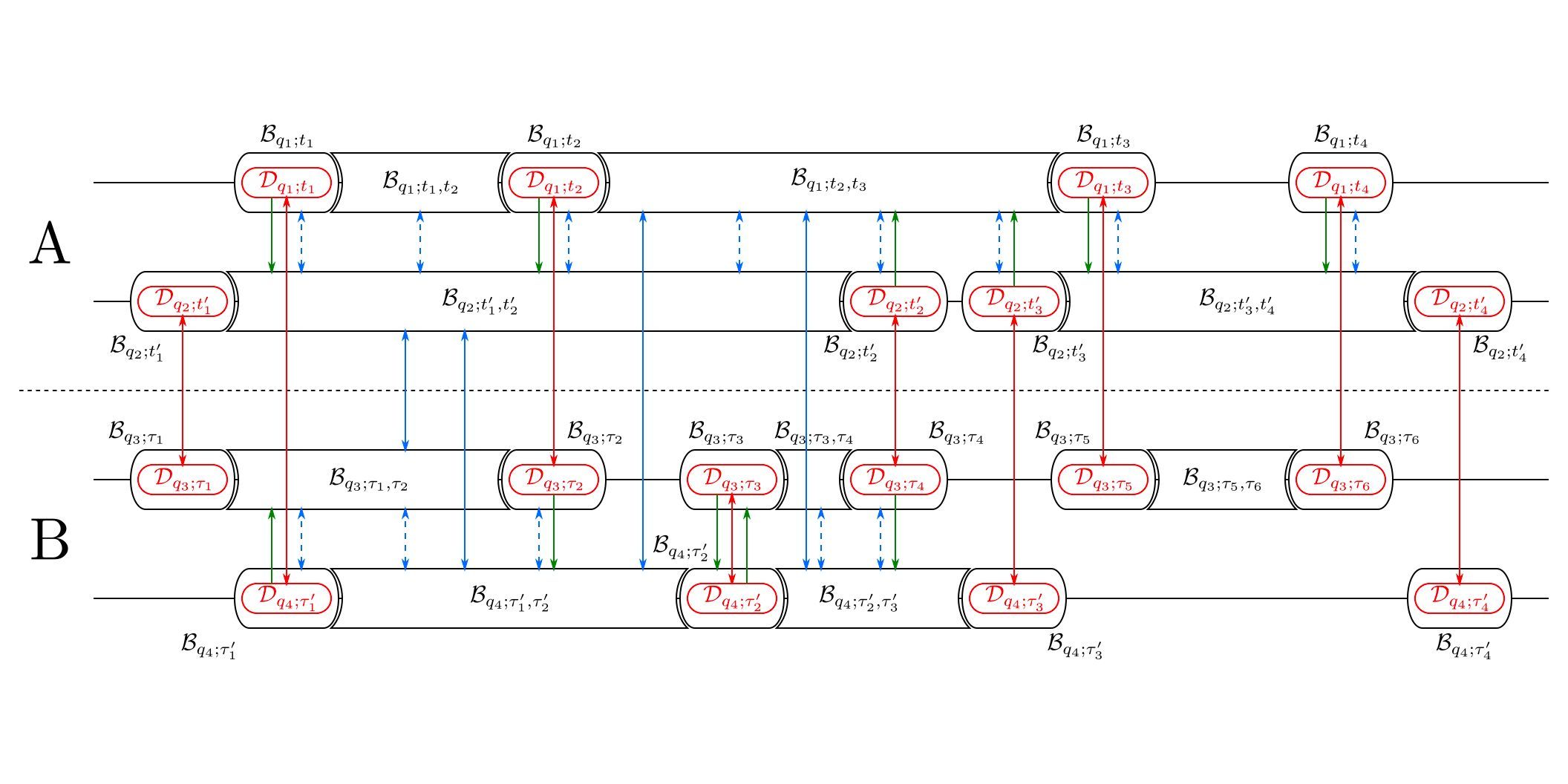
Fresh in Quantum: Entanglement-efficient bipartite-distributed quantum computing by Jun-Yi Wu, Kosuke Matsui, Tim Forrer, Akihito Soeda, Pablo Andrs-Martnez, Daniel Mills, Luciana Henaut, and Mio Murao
In noisy intermediate-scale quantum computing, the limited scalability of a single quantum processing unit (QPU) can be extended through distributed quantum computing (DQC), in which one can implement global operations over two QPUs by entanglement-assisted local operations and classical communication. To facilitate this type of DQC in experiments, we need an entanglement-efficient protocol. To this end, we extend the protocol in [Eisert et. al., PRA, 62:052317(2000)] implementing each nonlocal controlled-unitary gate locally with one maximally entangled pair to a packing protocol, which can pack multiple nonlocal controlled-unitary gates locally using one maximally entangled pair.

The Quantum Era Is Arriving, And It Will Be Transformational !
some aspects of quantum technologies are on the horizon, and we should be prepared to invest ensure that quantum capabilities for economic prosperity and national security are developed accordingly.

Quantum Technologies & Cybersecurity: The Urgent Call to Safeguard Our Digital Realm
A deep dive into the looming cybersecurity threats posed by quantum technologies.

Quantum Cybersecurity: The Future of Secure Communication
The significance of Quantum Cybersecurity in the era of quantum computers.

